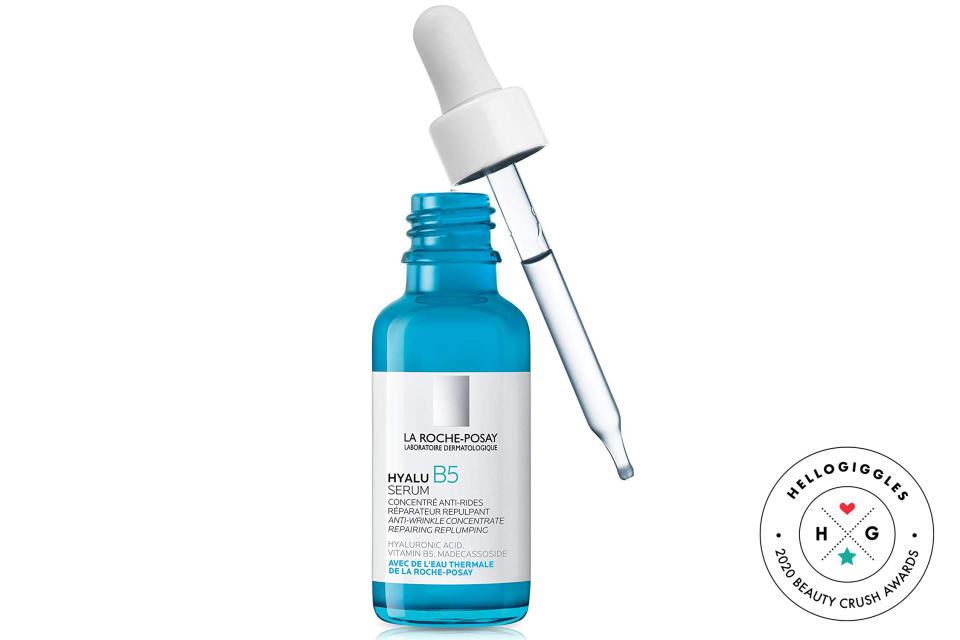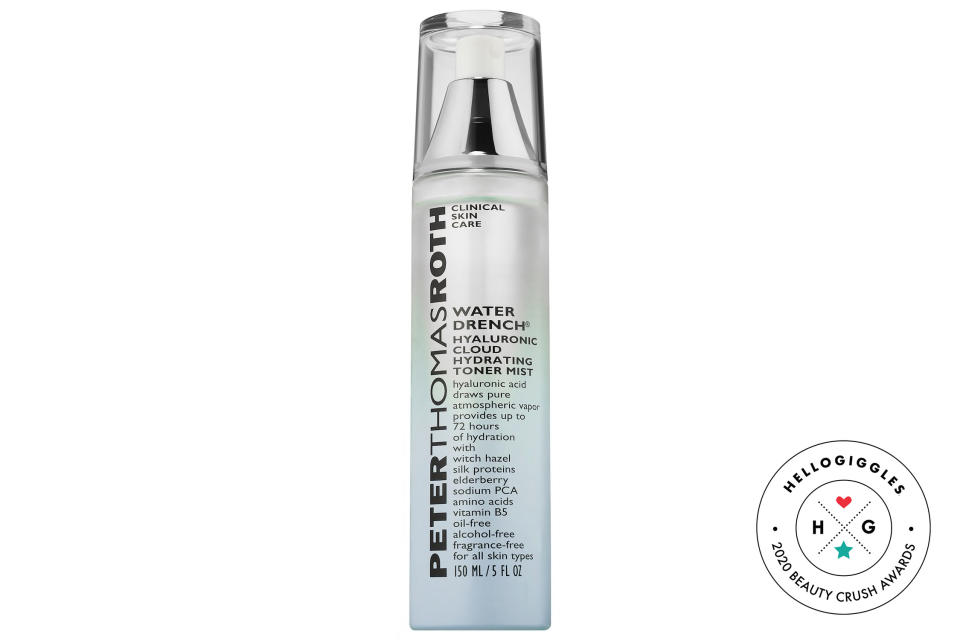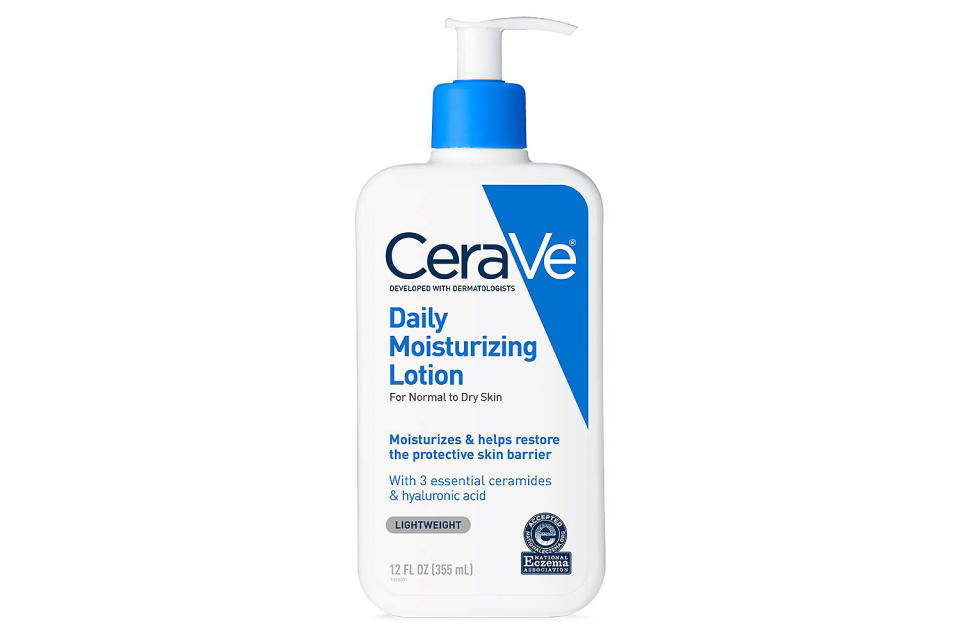Hyaluronic acid is the hero hydrating ingredient all dermatologists love—and this is how it works
Dry skin is one of our biggest beauty foes. It can be caused by the weather, harsh skincare products, excessive UVA/UVB exposure, and unhealthy lifestyle habits, like smoking. Dry skin can make you break out and look dull, and even cause itchiness. Thankfully though, there are so many skincare products and ingredients that can help you maintain a healthy (and moisturized!) skin barrier, like hyaluronic acid.
Hyaluronic acid is a popular ingredient you’ve probably noticed pop up in a ton of moisturizing skincare products, like face creams and serums. It’s an ingredient naturally found in our skin, and it’s known for its ability to hold up to 1000 times its weight in water, which then helps with moisture retention. Studies show that hyaluronic acid helps fight signs of aging by plumping fine lines, helps small wounds heal faster, and works to give skin a healthy glow. To better understand what hyaluronic is and how it works on our skin, we tapped a top-notch dermatologist and a celebrity-loved facialist to answer our most pressing questions.
What does hyaluronic acid do to your skin?
Basically, it helps replenish the skin of its moisture levels and gives it a boost of hydration. “I refer to hyaluronic acid as a big drink of water for the skin,” says celebrity facialist Candace Marino. “Its lightweight formula is instantly absorbed by the skin to quench parched, dull complexions—your skin literally drinks it up.”
Does hyaluronic acid really work?
Yes! Shari Sperling, D.O., a board-certified dermatologist, says that it takes a few weeks to see real results, which is how long skin takes to start responding to an ingredient due to the life cycle of skin cells.
What is hyaluronic acid made of?
“It can be animal-derived, plant-derived, or synthesized in a lab by fermenting bacteria,” explains Marino. “When it’s animal-derived, it usually comes from the connective tissues and joints of cows. Plant-derived hyaluronic acid comes from wheat or botanical sources.”
Who will best benefit from hyaluronic acid?
All skin types can benefit from it. The amount of hyaluronic acid we naturally produce in our bodies declines with age, so if you start to notice fine lines and wish to tackle them, that could be a good indicator of when to start incorporating it more into a regular skincare routine—especially since it works well with retinol. Marino also calls it a hero ingredient for those with oily or acne-prone skin: “When it comes to breakouts, generally people think to dry out their skin using harsh toners, drying masks and spot treatments, but the problem with this is that when stripped of its hydration and moisture levels, the skin will send a signal to the brain that it’s not protected and from there it will produce even more oil. Not only is hyaluronic acid important to address the hydration content of the skin, but it’s essential for holding on to moisture—it’s like a balancing act for the skin.”
Below, some of our favorite hyaluronic acid skincare products:
Best eye cream with hyaluronic acid: Neutrogena Hydro Boost Gel Eye Cream

The skin around our eyes is a lot thinner than the rest of our facial skin, which is why it’s so important to pay special attention to it. This eye cream comes in a gel-like formula and absorbs quickly into the skin, which makes it perfect for layering under makeup.
Best facial cream with hyaluronic acid: Peter Thomas Roth Water Drench Hydrating Moisturizer

This refreshing face cream feels like a splash of cool water on your face. It contains 30% concentrated hyaluronic acid, with three different molecular sizes that help target different skin layers for deeper impact and longer-lasting effect. Trust us, your skin will thank you.
Best serum with hyaluronic acid: La Roche-Posay Hyaluronic B5 Serum

Shop it! La Roche-Posay Hyaluronic B5 Serum, $29.99, amazon.com
Kavita Mariwalla, M.D., a board-certified dermatologist based in West Islip, NY, adores this budget-friendly pick: “I love this product for a few reasons: 1) Price point. For the quality of ingredients in it, it is priced really well. 2) B5 is a great ingredient for all skin types and madecassoside is a hero ingredient that acts as an antioxidant but also skin soother. Combine that with its hyaluronic acid and you’ve got a serum that has great workhouse ingredients in it.” We love it so much, we gave it a Beauty Crush Award.
Best toner with hyaluronic acid: Peter Thomas Roth Water Drench Hyaluronic Cloud Hydrating Toner Mist

“This toner uses hyaluronic acid to hydrate and instantly reduce the appearance of fine lines and wrinkles,” says Deanne Robinson, M.D., a dermatologist based in Connecticut. It’s incredibly easy to use (just 2-3 spritzes is all you need!), which is one of the reasons we gave it a Beauty Crush Award.
Best face mist with hyaluronic acid: Biossance Squalane + Hyaluronic Toning Mist

Give your skin a pick-me-up with a few spritzes of this Beauty Crush Award-winning face mist. “I’m obsessed with this product,” raves one HG tester. “I have one at my desk, one at home, and now even have the mini TSA-sized version so that I can travel with it.” It’s rich in antioxidants, hyaluronic acid, and peptides, so it hydrates the skin while soothing and protecting it as well.
Best face mask with hyaluronic acid: Vichy Aqualia Thermal Thermal Night Spa Cream and Mask

If you’re looking to double up on your moisturizing efforts, try an overnight face mask. This one has a velvety texture and is packed with hyaluronic acid other moisturizing ingredients, like squalane and glycerin. Beauty sleep? Check.
Best body lotion with hyaluronic acid: CeraVe Daily Moisturizing Lotion

Remember to give your body some love, too. This drugstore body lotion combines hyaluronic acid with moisturizing ceramides and has the seal of acceptance from the Eczema Association.

